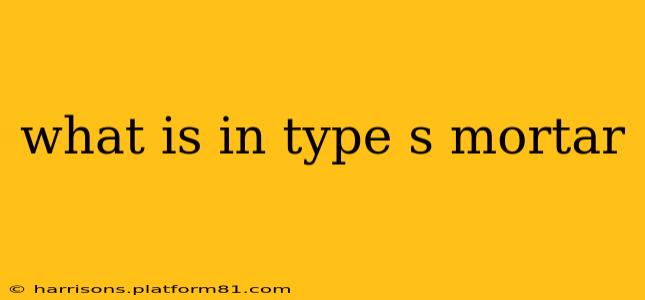What's in Type S Mortar? A Deep Dive into its Composition and Applications
Type S mortar is a versatile and high-strength masonry cement mortar, commonly used in various construction projects. Understanding its composition is crucial for selecting the right mortar for specific applications. This comprehensive guide will explore the ingredients of Type S mortar, its properties, and typical uses.
What are the main components of Type S mortar?
Type S mortar is primarily composed of Portland cement, hydrated lime, and fine aggregate (typically sand). The precise proportions of these ingredients vary depending on the manufacturer and specific application requirements, but the general composition remains consistent.
-
Portland Cement: This is the key binding agent, providing strength and durability to the mortar. The cement reacts with water (hydration) to form a hard, cohesive matrix that binds the other ingredients together.
-
Hydrated Lime (Calcium Hydroxide): This component improves workability, making the mortar easier to mix, apply, and finish. It also enhances water retention, which is important for achieving proper hydration of the cement and ensuring a strong bond. Hydrated lime also contributes to the mortar's plasticity and reduces shrinkage.
-
Fine Aggregate (Sand): This provides bulk and volume to the mortar. The sand particles fill the spaces between the cement and lime, increasing the mortar's overall strength and reducing shrinkage. The quality and grading of the sand are crucial factors influencing the final mortar properties. Too much fine sand can lead to weakness, while too much coarse sand can result in a harsh, difficult-to-work-with mix.
What makes Type S mortar different from other types?
Several types of mortar exist, each designated by a letter (M, N, O, S, K). Type S mortar distinguishes itself through its superior strength. This increased strength makes it suitable for applications requiring higher compressive and shear strength compared to other mortar types.
What are the typical uses of Type S mortar?
Type S mortar finds its use in a wide range of construction projects, including:
- High-strength masonry: It's ideal for load-bearing walls, where high compressive strength is crucial for structural integrity.
- Exterior applications: Its weather resistance makes it suitable for use in exposed areas.
- Reinforced masonry: Type S mortar is often specified for reinforced masonry units, where strong bonding between the masonry units and reinforcing steel is critical.
- Foundation walls: Given its strength, it's a preferred choice for constructing strong and stable foundation walls.
- Chimneys and fireplaces: Its durability and resistance to high temperatures make it suitable for chimney construction.
Is Type S mortar suitable for all masonry projects?
While Type S mortar offers superior strength, it's not always the optimal choice. Its higher strength can make it less workable than other types. If workability is a priority, a lower-strength mortar might be more appropriate. The project's specific requirements (structural demands, weather exposure, etc.) should dictate the choice of mortar type.
What are the key properties of Type S mortar?
The defining characteristics of Type S mortar include:
- High compressive strength: This is its primary advantage over other mortar types.
- Good bond strength: It provides a strong bond between masonry units.
- Moderate workability: While less workable than some other types, it's still manageable for skilled masons.
- Durability and weather resistance: Suitable for exterior applications.
How does Type S mortar compare to Type N mortar?
Type N mortar is a general-purpose mortar with moderate strength. Type S mortar possesses significantly higher strength than Type N, making it suitable for projects where increased structural integrity is crucial. However, Type N mortar is often preferred for projects requiring better workability.
Choosing the right mortar is critical for a successful construction project. Understanding the composition and properties of Type S mortar helps in making informed decisions, ensuring the durability and longevity of the structure. Always consult with a qualified mason or structural engineer to determine the appropriate mortar type for your specific needs.
